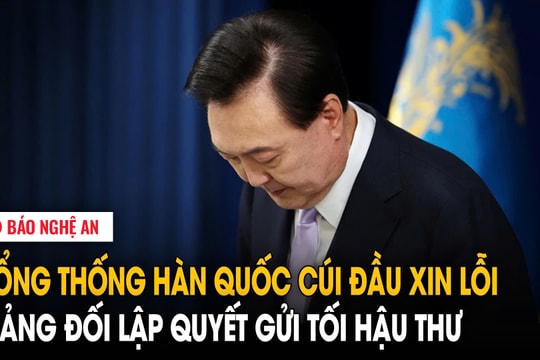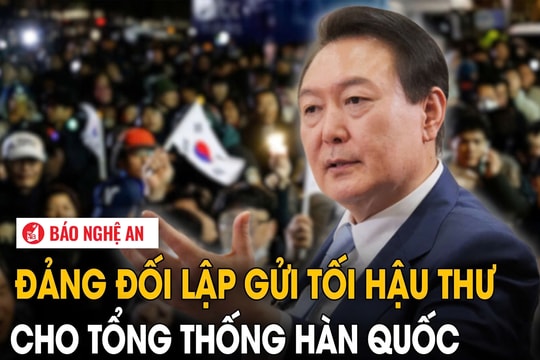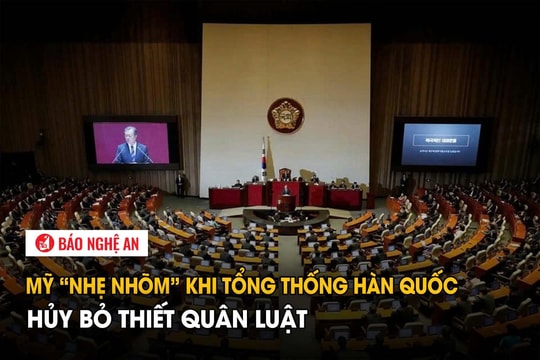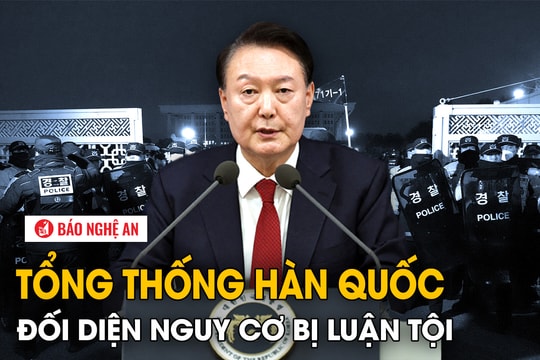South Korean President banned from leaving the country
South Korean President Yoon Suk-yeol was placed under a travel ban on December 9 pending an investigation into allegations of treason and other charges related to last week's brief declaration of martial law, Yonhap news agency reported.
.jpg)
The ban was imposed by the South Korean Justice Ministry shortly after the Corruption Investigation Office of Senior Officials (CIO) said it had filed a request to implement the order.
Reuters also reported that a South Korean Justice Ministry official said on December 9 that President Yoon Suk-yeol has been barred from leaving the country in connection with a failed attempt to impose martial law, amid growing calls for his resignation and a deepening leadership crisis.
Mr. Yoon apologized for the failed attempt and said he would leave his political and legal fate to the ruling People Power Party (PPP), but has not yet resigned. According to local media sources, he has become the subject of a criminal investigation.
On December 9, South Korea's Defense Ministry said Mr. Yoon remains the legal commander-in-chief, but his control of the government is in doubt amid growing opposition from senior military officers and his party said it would set up a working group to handle his eventual resignation.
Oh Dong-woon, head of the Corruption Investigation Office of High Officials, said he had issued an exit ban on Mr. Yoon when asked at a parliamentary session about actions taken against the embattled president.
Justice Ministry official Bae Sang-up told the committee that the exit ban had been enforced.
The commission was set up in 2021 to investigate senior officials, including the president and his family members, but does not have the power to prosecute the president. Instead, by law, it must refer the matter to the prosecutor's office.
Although Mr. Yoon survived an impeachment vote in the National Assembly on December 7, his party's decision to hand over presidential powers to the prime minister has plunged the key U.S. ally into a constitutional crisis.
Mr. Yoon has rejected calls to resign, including from some members of his ruling party, and his future became more uncertain over the weekend when Yonhap news agency reported he was under criminal investigation for alleged treason.
Prosecutors arrested former Defense Minister Kim Yong-hyun for his role in declaring martial law on December 3, Yonhap reported on December 8.
On December 3, Mr. Yoon granted the military broad emergency powers to crack down on what he called “anti-state forces” and obstructive political opponents. However, he revoked the order after just six hours, when the National Assembly defied a military and police blockade to vote down the decree.
Amid the protests, several military officials, including the acting defense minister, have said they will not comply with any new orders to impose martial law again.
The main opposition Democratic Party has called for Mr Yoon to be stripped of his military powers. It has also demanded the arrest of Mr Yoon and any military officials involved in the martial law incident.
Mr Yoon's People Power Party (PPP) has set up a working group to address, among other issues, "post-martial law political stability and Mr Yoon's orderly early resignation", a spokesman said on December 9.
On December 8, PPP leader Han Dong-hoon announced that the president would not be involved in foreign and state affairs, and Prime Minister Han Duck-soo would run government affairs until Mr. Yoon officially resigned.
The proposal has drawn criticism from the opposition, which says it is unconstitutional. The opposition says Mr. Yoon should be impeached or resign and face legal prosecution, and plans to introduce another impeachment bill later this week.
Professor Chang Young-soo of Korea University Law School said the president can delegate powers to the prime minister, especially control of the military, but there is still debate over whether the prime minister has the right to act as head of state in foreign affairs.
"Unlike the US vice president, the South Korean prime minister is not elected, which means their democratic legitimacy is weak. So it will also be a question of how long this system can last," he said.





